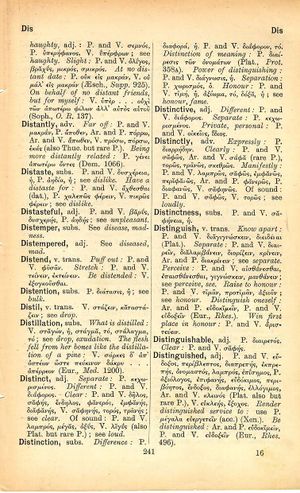distinctive: Difference between revisions
From LSJ
ὥσπερ γὰρ ζώου τῶν ὄψεων ἀφαιρεθεισῶν ἀχρειοῦται τὸ ὅλον, οὕτως ἐξ ἱστορίας ἀναιρεθείσης τῆς ἀληθείας τὸ καταλειπόμενον αὐτῆς ἀνωφελὲς γίνεται διήγημα → for just as a living creature which has lost its eyesight is wholly incapacitated, so if history is stripped of her truth all that is left is but an idle tale | for, just as closed eyes make the rest of an animal useless, what is left from a history blind to the truth is just a pointless tale
m (Text replacement - "}}]]" to "}}]]") |
m (Text replacement - "(|thumb)\n(\|link=)" to "$1$2") |
||
| Line 1: | Line 1: | ||
{{Woodhouse1 | {{Woodhouse1 | ||
|Text=[[File:woodhouse_241.jpg|thumb | |Text=[[File:woodhouse_241.jpg|thumb|link={{filepath:woodhouse_241.jpg}}]]'''adj.''' | ||
|link={{filepath:woodhouse_241.jpg}}]]'''adj.''' | |||
<b class="b2">Different</b>: P. and V. [[διάφορος]]. | <b class="b2">Different</b>: P. and V. [[διάφορος]]. | ||
<b class="b2">Separate</b>: P. κεχωρισμένος. | <b class="b2">Separate</b>: P. κεχωρισμένος. | ||
Revision as of 17:10, 18 May 2020
English > Greek (Woodhouse)
adj.
Different: P. and V. διάφορος. Separate: P. κεχωρισμένος. Private, personal: P. and V. οἰκεῖος, ἴδιος.
Latin > French (Gaffiot 2016)
distīnctīvē (distinguo), de façon qui distingue : Prisc. Gramm. 17, 193.
Latin > German (Georges)
dīstīnctīvē, Adv. (*distinctivus v. distinguo), unterscheidend, Prisc. 17, 193.

